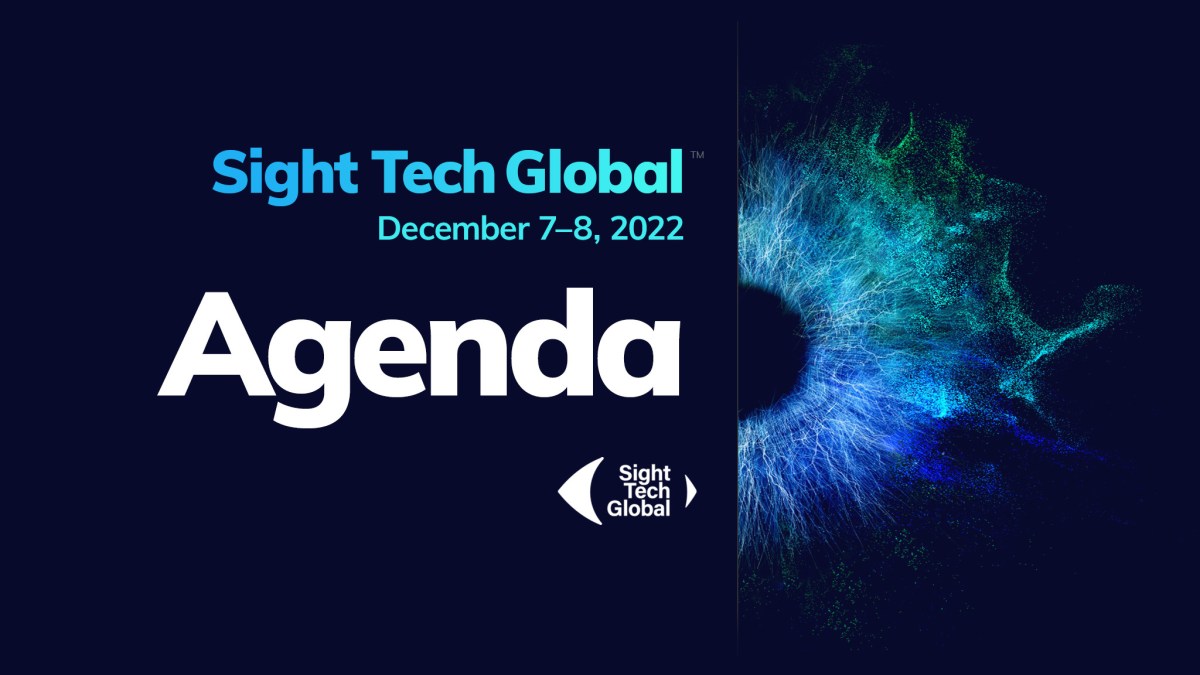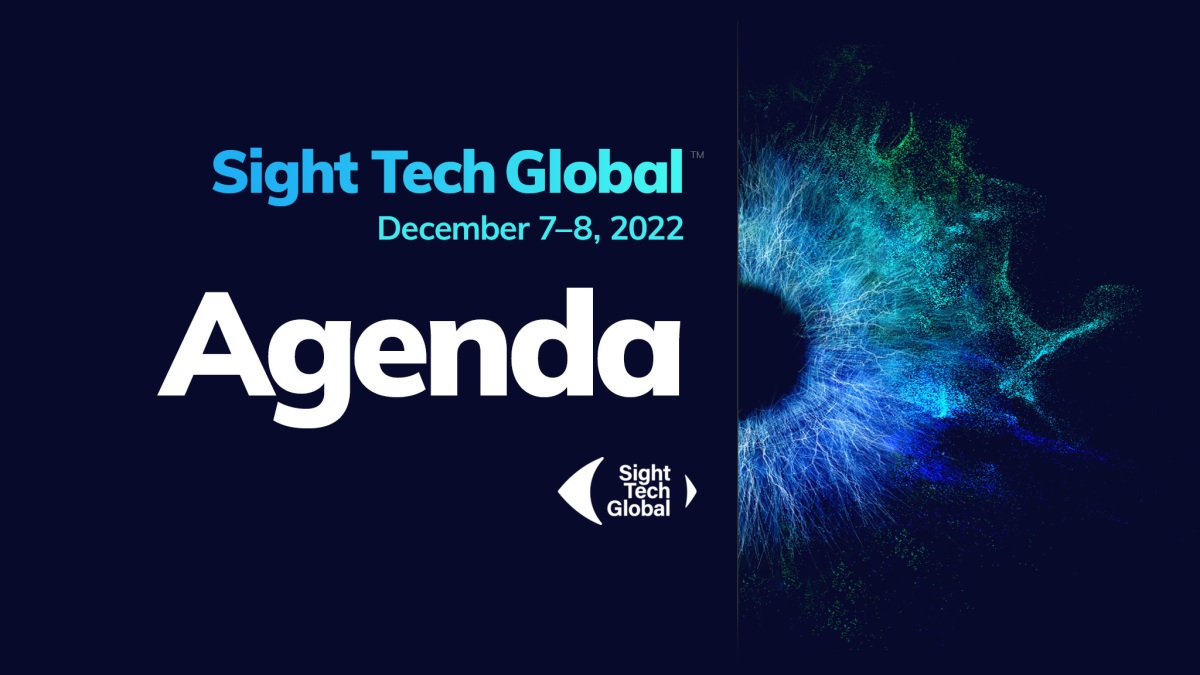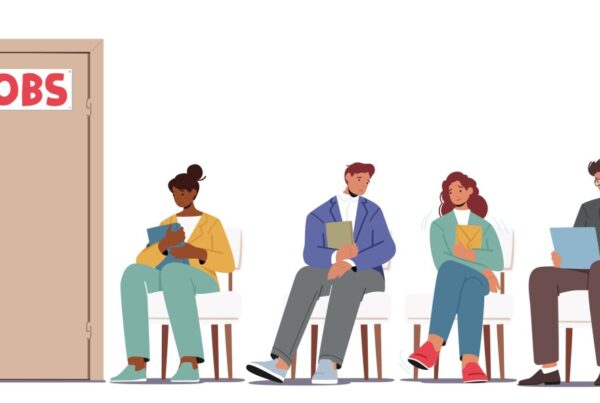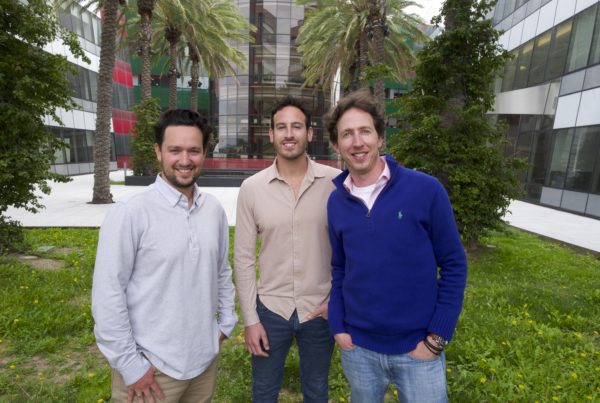
The third annual Sight Tech Global conference, a virtual, free and highly accessible event on December 7 and 8 convenes some of the world’s top experts working on assistive tech, especially AI, for people who are blind or visually impaired. If you don’t follow this topic, maybe you should, because a lot of cutting-edge tech over the years — think OCR and NLP — was developed at the outset with blind people in mind, and went from there to more mainstream uses. Register today!
At this year’s event we have sessions with the creators of several new devices to assist with vision, and we’ll talk about the technology architecture decisions that went into balancing capability with cost and tapping existing platforms.
We’ll also take our first look at accessibility in VR, which is an area of huge concern because if/when VR takes off in the entertainment and business worlds, it’s vital that people without vision have access, as they do today on smart phones and computers thanks to screenreaders like JAWS, VoiceOver and NVDA.
Our third big slab of programming is about AI itself. There is no shortage of hype as far as AI’s capabilities, and it’s important to push back on that by discussing some serious limitations and deficits in the way today’s AI works for people with disabilities, not to mention humanity in general. At the same time, AI is arguably the best core tech ever for people without sight. Understanding AI is vital to the future of everyone with disabilities for all those reasons. Don’t forget to register today!
And before you browse this awesome agenda: For technologists, designers and product folks working on earthshaking assistive tech, we’re hosting a small, in-person event on December 9 featuring workshops on assistive tech, many run by the same luminaries on the agenda. Interested? Contact us.
Here’s the agenda. To see times and more, go to the Sight Tech Global agenda page.
The Dynamic Tactile Device: That “Holy Braille” for educations is near
Following up on last year’s discussion of the APH and Humanware collaboration to create an education-focused tactile display (see next session), Greg Stilson updates Sight Tech Global on the project’s progress and APH’s work toward an SDK for developers to build on the tactile display. Greg Stilson will also lead a breakout session for attendees who want to go deeper on the Dynamic Tactile Device.
Greg Stilson, Head of Global Innovation, APH
Moderator: Devin Coldewey, Writer & Photographer, TechCrunch
The DOT Pad: How the Bible and smartphone speaker tech inspired a breakthrough
For decades, engineers have worked toward a braille display that can render tactile images and multiline braille. DOT Pad may have cracked the code with an innovative approach to generating dynamic fields of braille pins actuated by smart integrations combined with existing technologies, like Apple’s VoiceOver. Eric Kim and Ki Sung will also lead a breakout session for attendees who want to learn more.
Eric Ju Yoon Kim Co-Founder/CEO DOT
Ki Kwang Sung Co-Founder/CEO DOT
Moderator: Devin Coldewey Writer & Photographer TechCrunch
Virtual Reality and Inclusion: What does non-visual access to the metaverse mean?
People with disabilities and accessibility advocates are working to make sure the metaverse is accessible to everyone. This panel will delve into research on the challenges current virtual and augmented reality tools create for people who are blind or have low vision.The panelists will share their experiences using immersive technologies and explore how these tools can be used to enhance employment opportunities in hybrid and remote workplaces — but only if they are built with inclusion in mind.
Moderator Bill Curtis Davidson Co-Director, Partnership on Employment & Accessible Technology (PEAT)
Alexa Huth, Director Strategic Communications, PEAT
Brandon Keith Biggs, Software Engineer, The Smith-Kettlewell Eye Research Institute and CEO XR Navigation
Aaron Gluck, PhD candidate in Human-Centered Computing, Clemson University
Inventing the “screenreader” for VR: Owlchemy Lab’s Cosmonious High
For developers of virtual reality games, there’s every reason to experiment with accessibility from the start, which is what the Owlchemy Labs team did with Cosmonious High, the 2022 release of a fun, first-person game situated in an inter-galactic high school that one reviewer said “has all the charm and cheek of a good Nickelodeon kids show.” And it reveals some of the earliest approaches to accessibility in VR.
Peter Galbraith, Accessibility Engineer II, Owlchemy Labs
Jazmin Cano, Accessibility Product Manager II, Owlchemy Labs
Moderator James Rath, Filmmaker, Accessibility Advocate and Gamer
Audio Description the Pixar Way
AI-driven, synthetic audio description may have a place in some forms of accessible video content, but the artistry of the entirely human-produced audio descriptions Pixar produces for its productions set a creative standard no AI will ever attain, and that’s all for the good. Meet members of the Pixar team behind excellence in audio descriptions.
Eric Pearson, Home Entertainment Supervisor, Pixar
Anna Capezzera, Director, Audio Description Operations, Deluxe
Laura Post, Voice Actress
Christina Stevens, Writing Manager, Deluxe
Moderator Tom Wlodkowski, Vice President, Accessibility, Comcast
Seeing AI and the New AI
Microsoft’s hugely popular Seeing AI is one of the apps that appears to do it all, from reading documents to recognizing people and things. Those services are enabled by Microsoft’s rapidly advancing cloud-based AI systems. How is Seeing AI advancing with those capabilities and what is the future for Seeing AI?
Saqib Shaikh, Co-founder of Seeing AI, Microsoft
Moderator Larry Goldberg, Accessibility Sensei & Technology Consultant
Accessibility Is AI’s Biggest Challenge: How Alexa aims to make it fairer for everyone
Smart home technology, like Alexa, has been one of the biggest boons in recent years for people who are blind, and for people with disabilities altogether. Voice technology and AI help empower people in many ways, but one obstacle stands in its way: making it equitable. In this session, learn from Amazon about how they’re approaching the challenge ahead.
Peter Korn, Director of Accessibility, Devices & Services, Amazon
Josh Miele, Principal Accessibility Researcher, Amazon
Caroline Desrosiers, Founder & CEO, Scribely
Hands on with Seleste
Rapid advances in phones, data networks and hardware miniaturization always seem to be converging on the concept of that super useful, affordable, unobtrusive assistive device. Seleste plans to launch later this year with a pair of tech-enabled glasses that mark an important waypoint on that journey.
Shubh Mittal, Founder, Seleste
Smit Patel, Co-Founder, Seleste
Moderator, Jennison Asuncion, Head of Accessibility Engineering Evangelism, LinkedIn
Hands on with ARx
Like Seleste, ARx is a recently released device designed to take advantage of the technology tech platforms that surround everyday life with a private, minimally visible, head-mounted device. Both the Seleste and ARx leaders will discuss what they’ve learned in the course of developing and testing their devices.
Charles Leclerq, CEO, ARx Vision
Moderator, Lucy Greco, Electronic accessibility expert and consultant
What’s Next with StellarTrek
Where Seleste and ARx are newcomers to assistive devices, Humanware is a highly respected, established player whose new StellarTrek also takes powerful advantage of technology advances but also parts ways with the newcomers when it comes to technology architecture and form factors.
Louis-Philippe Massé, Vice President of Product Innovation and Technologies, Humanware
Peter Tucic, Director of Strategic Partnerships, Humanware
Moderator, Sam Proulx, Accessibility Evangelist, Fable
The Problems with AI
Despite the stunning advances in AI over the past decade, the so-called “deep learning” AI technology prevalent today has under-appreciated limitations and even poses societal dangers. Our speakers are world-renowned AI experts and AI “dissenters” who believe we need an AI that’s both more accountable and better able to produce common sense results.
David Ferrucci, Founder & CEO, Elemental Cognition
Gary Marcus, Founder and Executive Chairman, Robust AI
Moderator, Ned Desmond, Founder and Executive Producer, Sight Tech Global
Did Computer Vision AI Just Get Worse or Better?
The ability of assistive tech devices to recognize objects, faces and scenes is a type of AI called Computer Vision, which calls for building vast databases on images labeled by humans to train AI algorithms. A new technique called “one-shot learning” learns dramatically faster because the AI trains itself on images across the internet. No human supervision needed. Is that a good idea?
Danna Gurari, Asst. Professor, Founding Director, Image & Video Computing group, University of Colorado Boulder
Moderator, Cecily Morrison, Principal Researcher, Microsoft Research Cambridge
What Waymo Learned at the DOT Inclusive Design Challenge
Waymo participated in the U.S. Department of Transportation Inclusive Design Challenge, and emerged with numerous accessibility lessons and features that will help Waymo’s autonomous rides offer people with disabilities better service. Waymo’s team is still processing all they learned.
Lauren Schwendimann, UX Design Lead & Manager, Waymo
Jeffrey Colon, Director of Access Technology, Lighthouse for the Blind and Visually Impaired
Moderator, Mike May, Chief Evangelist, Goodmaps
Don’t forget to register for this free, virtual event.
We’re grateful to current sponsors iSenpai, Google, Amazon, LinkedIn, Humanware, Microsoft, Ford, Fable, APH and Waymo. If you would like to sponsor the event, please contact us. All sponsorship revenues go to the nonprofit Vista Center for the Blind and Visually Impaired, which has been serving the Silicon Valley community for 75 years.





